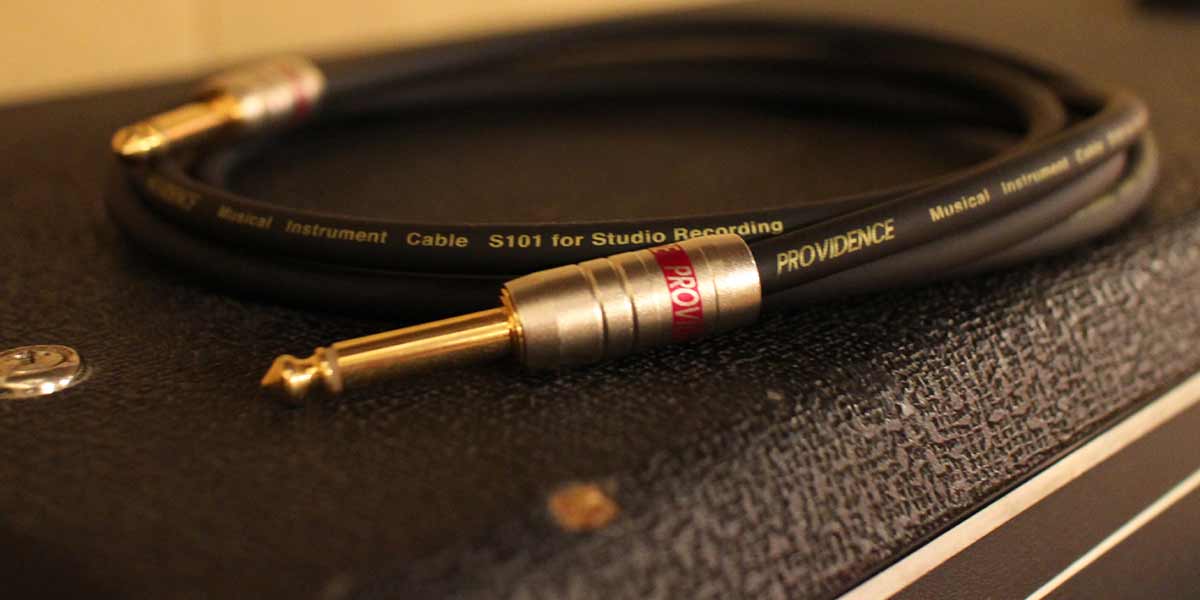
An important part of your setup is the guitar cable that carries your precious sound. But how does a guitar cable actually work?
How does a guitar cable work
When you play an electric guitar, the sound generated by the vibrating strings is converted into electrical signals by the guitar’s pickups. These pickups are essentially magnets wrapped with coils of wire. When the strings vibrate, they disturb the magnetic field around the pickups, inducing small electrical currents in the coils. These electrical signals are very weak and need to be amplified before they can be heard.
What parts does a guitar cable consists of?
To transfer these electrical signals from the guitar to an amplifier or other audio equipment, you use a guitar cable. A typical guitar cable consists of a conductive wire surrounded by an insulating material and an outer shield.
Conductor
The center part of the cable, known as the conductor, is a wire made of a conductive material, usually copper. The electrical signals from the guitar’s pickups flow through this conductor.
Insulation
The conductor is surrounded by a layer of insulation, typically made of materials like PVC (polyvinyl chloride) or rubber. The insulation prevents the electrical signals from coming into contact with the outer shield and interfering with other electrical components.
Shield
Surrounding the insulation is the outer shield, which is also made of a conductive material like copper. The shield acts as a barrier to prevent interference from external electrical sources, such as electromagnetic fields.

High-quality guitar cable
Many guitarists underestimate the role of a high-quality cable in shaping their tone. A guitar cable is responsible for carrying the signal from your instrument to the amplifier or audio interface, making it a crucial link in the audio chain. A cheap or poorly constructed cable can introduce signal loss, interference, and a loss of high-frequency response, ultimately degrading your sound. Investing in a high-end guitar cable can drastically improve the overall tonal integrity, clarity, and reliability of your setup.
Poorly constructed cables cause sound degradation
When using a poorly constructed or a long cable with a guitar, the sound can change due to a number of factors
Capacitance
Every cable has a certain amount of capacitance, which is the ability to store an electrical charge. When you use a longer cable, the capacitance increases. This increased capacitance can cause a reduction in the high-frequency response of your guitar signal, resulting in a slightly darker or muffled tone.
Resistance
Longer cables also have higher resistance due to the increased length of the wire. Resistance can cause a small amount of signal loss, especially in high frequencies. This loss of high frequencies can result in a loss of clarity and brightness in your guitar tone.
Induction
Inductance is the property of a cable to induce a magnetic field when a current flows through it. Although the inductance of a guitar cable is relatively low, longer cables can have a slightly higher inductance compared to shorter ones. This increased inductance can affect the high-frequency response and lead to a slight loss of treble.
Signal degradation
As the guitar signal travels through a longer cable, it is more susceptible to picking up electromagnetic interference (EMI) and radio frequency interference (RFI) from the surrounding environment. This interference can introduce noise or hum into the signal, affecting the overall sound quality.

Longer cables and tonal changes
It’s important to note that the tonal changes caused by using a longer cable are usually subtle and might not be noticeable in shorter lengths. Additionally, the quality and type of cable can also play a role in how much the sound is affected. Using high-quality cables with good shielding can help minimize these issues and maintain a cleaner and truer guitar tone, even with longer cable lengths.
Which brands should I consider?
There are many brands that make excellent guitar cables. Depending on your available budget, you should think of a minimum amount of about 25 euros for a 3-meter cable. A guitar cable is part of your sound chain and the amount you spend on it should be proportionate to the amount you spend on the other parts. Brands we are fans of are: Monster Cable, Providence, Ernie Ball and Evidence (especially for patch cables between your effects). But there are many more good brands that make excellent guitar cables.
Conclusion
When it comes to achieving the perfect guitar tone, every element matters, including the humble guitar cable. Investing in a high-end guitar cable can significantly elevate your playing experience, delivering pristine sound quality, enhanced signal transparency, and unwavering reliability. By considering the construction, materials, and features of these cables, you can find the ideal companion for your musical journey. Remember, the chain is only as strong as its weakest link, and with a high-end guitar cable, you can ensure that your tone remains untarnished, allowing your music to soar to new heights.
